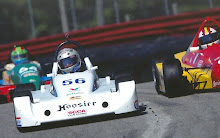
One afternoon, while completing a “personality profile” questionnaire I came across a question that really made me think. You are probably familiar with these questionnaires and may have even taken one, like the Myers-Briggs or maybe a different one given to you by your employer or a college career counselor, etc. These exercises attempt to categorize your personality in order to help you better understand yourself and how and why you interact with other people the way you do.
Most of the questions are very straight-forward and don’t require much thought to answer. This particular question was no exception. However, it did linger in my thoughts for days, weeks, even months later . . .
Most of the questions are very straight-forward and don’t require much thought to answer. This particular question was no exception. However, it did linger in my thoughts for days, weeks, even months later . . .
Does driving a racing car appeal to you?
I’ve been driving cars competitively now for six years. Many family members, friends, and even acquaintances express an inability to understand why anyone would “want” to race. In fact, I’m quite sure my wife is still in this group. The reason I find the question above so interesting is because many other friends, acquaintances, and family members understand instantly and completely. I’ll refer to this group of people collectively as “racers”. The initial intrigue was because people are so divided on this subject, either “no way” or “absolutely”. To understand what’s behind people’s reasoning, the first logical question you ask is “Why?” The “no ways” top reason is almost always...
Racing is too dangerous.
Yet statistics and experts agree that racing safety equipment and technology has improved dramatically in the past few decades, making racing a very safe sport. In fact it’s now commonplace to see horrifying auto racing crashes that make your heart sink, until the driver emerges unhurt and waives to the crowd. Joey Hand’s recent crash at the Mid-Ohio Sports Car Course is just one of many examples of this. http://www.youtube.com/watch?v=CiZ9Wc1yh8s
In fact, if you research dangerous sports, racing is rarely discussed in this context when based on actual injury/fatality statistics or any scientific analyses of inherent dangers when all typical safety equipment and procedures are used.
In fact, if you research dangerous sports, racing is rarely discussed in this context when based on actual injury/fatality statistics or any scientific analyses of inherent dangers when all typical safety equipment and procedures are used.
Commonly mentioned as “Dangerous Sports” . . .
Base Jumping l Street Luging
Heli-Skiing l Mountain Climbing
Cave Diving l White Water Rafting
Bull Riding l BMX
Big-Wave Surfing
Heli-Skiing l Mountain Climbing
Cave Diving l White Water Rafting
Bull Riding l BMX
Big-Wave Surfing
Yet this common response only serves to demonstrate the “no ways” misunderstanding of the sport and thus motivate me to help people understand. Therefore, let me dispel some of the other most common misconceptions . . .
“Racing is a bunch of guys that refuse to grow-up”
“Racing is a bunch of guys that refuse to grow-up”
This statement is wrong in multiple ways . . . first, women are the fastest growing segment in racing. Second, anyone at the track to live out a childhood dream will likely not be there long. This is the case because racing, in any form, takes an extraordinary amount of time, hard work, mental focus, emotional energy, and commitment. Various forms of “track days” have flourished in recent years catering to driving enthusiasts. I still consider myself one of them and love a good track day. However, my first love is racing, which is altogether different. When confronted with what it takes to “go racing”, those that have not “grown-up” run home to mommy.
“Racing is expensive”
“Racing is expensive”
Like any other sport, racing can be expensive. However, many real racing options exist that cost no more than a serious golf habit or boating hobby. For example, karting is fun and affordable sport the whole family can enjoy. The Sports Car Club of America (my club) also has many affordable auto racing options for anyone with a driver’s license. In fact, I’ve compared my racing costs with friend’s passions and have spent less than many hunters, fishermen, or boaters.
But dispelling misunderstandings doesn’t necessarily help anyone understand. And therein lies the heart of what interests me most about this divide. It’s not what racing isn’t, but what it is that draws racers to it. Unfortunately, when asking a racer what it is about their sport that compels them to expend enormous effort on it, they often respond with something like . . .
“I’m just addicted to racing like it’s crack!”
So it’s obvious that racing is an addictive type sport. But why they’re addicted is what I’m really interested in. It’s understood that the speed aspect of racing results in adrenalin and endorphins being released in a driver, resulting in feelings of euphoria, excitement, and pleasure. However, just like any roller coaster fanatic can attest, this effect diminishes over time. Racing drivers barely notice these effects after just several races. This fact is actually important to safe, controlled racing and is part of the reason racing school’s and licensing bodies require so much track time.
When prodded further, most drivers then come out with something like . . .
“It’s something I just can’t put into words for anyone that hasn’t experienced it!”
Again, this doesn’t help anyone “get it”. I believe the truth is they simply haven’t ever tried hard enough to translate their true thoughts and feelings on this subject into words for others to understand.
So, in order to not be a hypocrite, I will try . . .
“First and foremost, racing is a competition!”
My father gave me an over-active mutant competitive gene. I love to compete at anything and everything-athletics, board games, trivia--you name it! I’ve found this mutant gene in every racer I know. Funny thing is, this gene causes racers to enjoy competition so much, they even enjoy losing to a competitor that beats them “fair and square” on-track. Respect, honor, and friendship grows amongst racers as they take turns out-doing each other. Racers will even go out of there way in order to help a competitor-in-need (time, parts, etc.) make a race and possibly even win. I’ve been on both sides of this “honor amongst racers” and look forward to sharing some of those stories in future articles.
“Racing is a series of accomplishments”
My wife often asks me “are you ready for your upcoming race?” I usually answer with a yes, no, or “I will be after…“ However, going through my mind is an enormously complex list of things to do to be ultimately prepared for the race. The legendary Carroll Smith wrote a series of books on how to engineer, prepare, set-up, and drive your car to win. These books are considered amongst the “Bibles of Racing”, and reveal that no car, engineer, mechanic, or driver is perfect, or even close. However, it is the non-stop pursuit of perfection in all aspects of racing that provides the many goals along the way to the final objective, winning.
“What’s your personality profile?”
I can’t remember what the result of that personality profile test was. However, that one question I do remember has helped me to better understand what makes me tick and how that might be different from others. So, if ever asked that question, I’ll just reply “RACER!”

